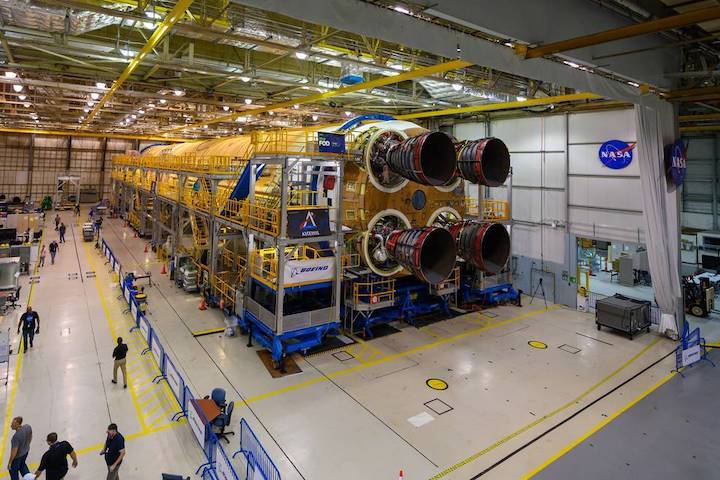13.11.2019

Media and social media influencers are invited to NASA’s Michoud Assembly Facility in New Orleans Monday, Dec. 9, for Artemis Day: Michoud/Stennis. Those attending will get a rare, up-close look at the core stage for NASA’s Space Launch System (SLS) rocket that will help power the first Artemis mission to the Moon.
Artemis Day will begin at 9 a.m. EST (8 a.m. CST) and feature a news conference with NASA Administrator Jim Bridenstine, who will discuss the status of the agency’s Artemis program. A question-and-answer session will follow the discussion. The news conference will be carried live on NASA Television and agency website.
On Tuesday, Dec. 10, participants also will have the opportunity to visit and tour NASA’s Stennis Space Center in Bay St. Louis, Mississippi, and see where the core stage will be tested before it is shipped to NASA’s Kennedy Space Center in Florida for launch with the Orion spacecraft.
Media who would like to attend the event should contact Tracy McMahan at 256-544-0034 or Tracy.McMahan@nasa.gov no later than 5 p.m. CST, Wednesday, Dec. 4, and provide information for badging. Media should plan to arrive at Michoud by 7 a.m. CST, Monday, Dec. 9.
Social media influencers are invited to register to attend the event. A maximum of 50 social media users will be selected for the event and will be given access similar to traditional media. Social media registration for this event opens Tuesday, Nov. 12, and closes at 11:59 p.m. CST Friday, Nov. 15. Only one person can register for each social account/site, and the registration cannot be is transferred to another person. Full details on applying for NASA Socials can be found at:
https://www.nasa.gov/connect/social/index.html
Media and social media influencers must be U.S. citizens with at least one form of valid, government-issued photo identification. All attendees must wear long pants and flat, closed-toe shoes with no heels.
Media and social influencers will have the opportunity to:
- See the completed core stage for Artemis I before it is shipped from Michoud to Stennis for engine testing
- View and photograph flight hardware for Artemis II, the second mission of SLS and Orion, which also will include NASA astronauts
- See the core stage pathfinder that is the same size and shape as the core stage flight article
- Tour NASA’s Pegasus barge, which will transport the core stage first to Stennis for testing, then to Kennedy for Artemis I launch preparations
- Meet and interview key NASA personnel and experts, including lunar scientists and prime contractors, from across NASA about all aspects of the Artemis missions
- Participate in a live discussion and question-and-answer session with NASA Administrator Jim Bridenstine and a panel of key subject matter experts
On Nov. 6, engineers and technicians attached the last of four RS-25 engines that will provide the necessary thrust for the rocket to reach space. To complete assembly of the stage, technicians now are attaching the engines to propulsion and avionics systems inside the core stage, which also houses the flight computers that control the rocket during its first eight minutes of flight. In December, engineers will perform testing on all the avionics and electrical systems. Then, NASA’s barge, Pegasus, will transport the completed core stage from Michoud to Stennis for the Green Run test series in 2020.
The 212-foot-tall core stage, comprised of two liquid propellant tanks and four RS-25 engines, is the powerhouse of the SLS rocket. It will produce more than 2 million pounds of thrust to send Orion, astronauts, and cargo to the Moon. It is the largest, most complex rocket stage NASA has built since the Saturn V stages that powered the Apollo missions to the Moon.
SLS and Orion, along with the Gateway in orbit around the Moon, are NASA’s backbone for deep space exploration and the Artemis program, which will send the first woman and next man to the lunar surface by 2024. SLS is the only rocket that can send Orion, astronauts, and supplies to the Moon on a single mission.
Quelle: NASA

